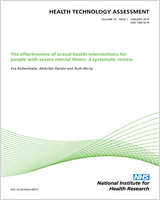Included under terms of UK Non-commercial Government License.
NCBI Bookshelf. A service of the National Library of Medicine, National Institutes of Health.
Stein RC, Dunn JA, Bartlett JMS, et al.; on behalf of the OPTIMA Trial Management Group. OPTIMA prelim: a randomised feasibility study of personalised care in the treatment of women with early breast cancer. Southampton (UK): NIHR Journals Library; 2016 Feb. (Health Technology Assessment, No. 20.10.)

OPTIMA prelim: a randomised feasibility study of personalised care in the treatment of women with early breast cancer.
Show detailsThe authors LR, SP and JLD are non-clinical (female) researchers employed by the University of Bristol (both currently and at the time of conducting data collection). LR and SP work within a team that specialises in identifying and addressing recruitment issues in challenging RCTs, which is led by JLD. At the time of interviews, LR (the main researcher undertaking data collection) had 1 year of post-doctoral experience, with over 4 years of training in the use of qualitative methodology. JLD, who conducted one interview, is a professor of social medicine with over 20 years of experience in the application of qualitative (among other) research methods.
LR approached this project as a naive researcher, with little knowledge of the field or literature. JLD and SP had prior experience of working on identifying recruitment challenges across a number of other RCTs, and thus had extensive knowledge of the field through their awareness of the literature and personal research. This prior knowledge may have influenced SP’s and JLD’s interpretation of data, although their contributions were largely based on LR’s initial interpretation and analytical thoughts, rather than raw data. SP’s prior knowledge may have influenced her double coding (conducted on 10% of transcripts), but analytical thoughts were largely similar to those expressed by LR (who was more likely to have a more purely inductive approach to analysis). Any differences in views were discussed and resolved in double-coding exercises. We have no reason to believe that any of the researchers’ personal experiences or life histories would have influenced their approaches to data collection and analysis in a noteworthy way.
- Qualitative research study profiles - OPTIMA prelim: a randomised feasibility st...Qualitative research study profiles - OPTIMA prelim: a randomised feasibility study of personalised care in the treatment of women with early breast cancer
- Ongoing trials - Clinical effectiveness and cost-effectiveness of use of therape...Ongoing trials - Clinical effectiveness and cost-effectiveness of use of therapeutic monitoring of tumour necrosis factor alpha (TNF-α) inhibitors [LISA-TRACKER® enzyme-linked immunosorbent assay (ELISA) kits, TNF-α-Blocker ELISA kits and Promonitor® ELISA kits] versus standard care in patients with Crohn’s disease: systematic reviews and economic modelling
- Plain English summary - Different temperature thresholds for antipyretic interve...Plain English summary - Different temperature thresholds for antipyretic intervention in critically ill children with fever due to infection: the FEVER feasibility RCT
- References - OPTIMA prelim: a randomised feasibility study of personalised care ...References - OPTIMA prelim: a randomised feasibility study of personalised care in the treatment of women with early breast cancer
- Summary of current diabetes health economic models - Optimal strategies for iden...Summary of current diabetes health economic models - Optimal strategies for identifying kidney disease in diabetes: properties of screening tests, progression of renal dysfunction and impact of treatment – systematic review and modelling of progression and cost-effectiveness
Your browsing activity is empty.
Activity recording is turned off.
See more...